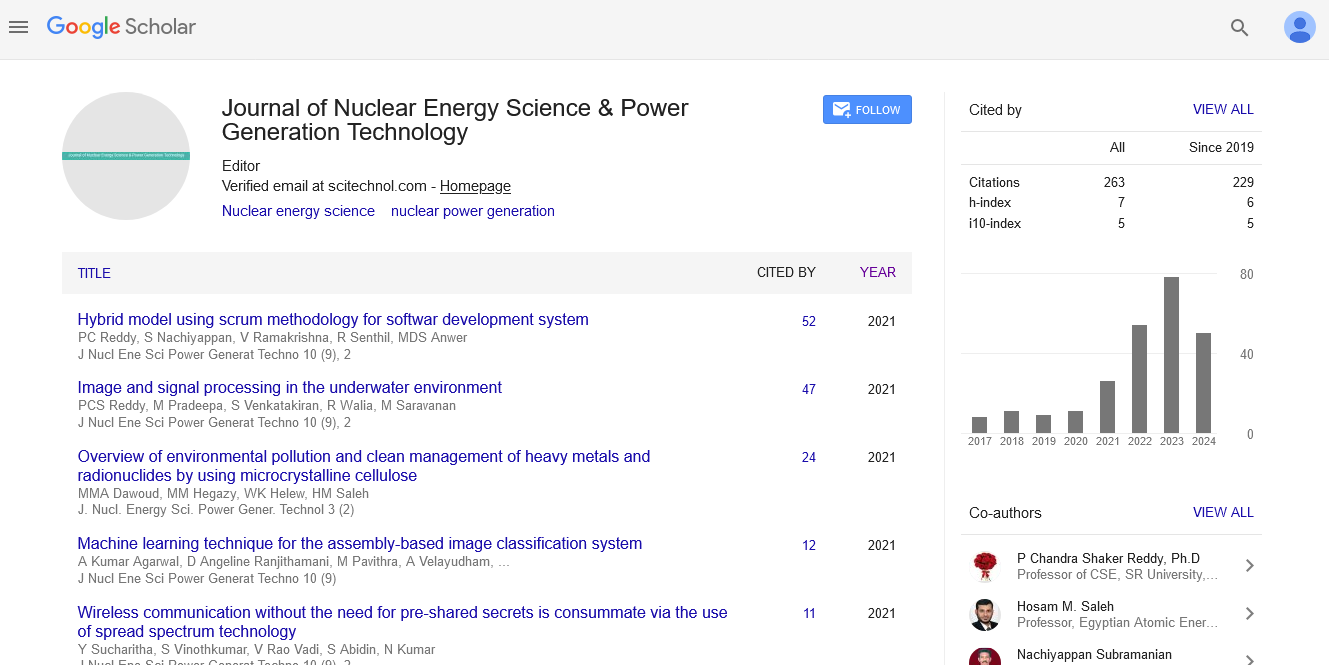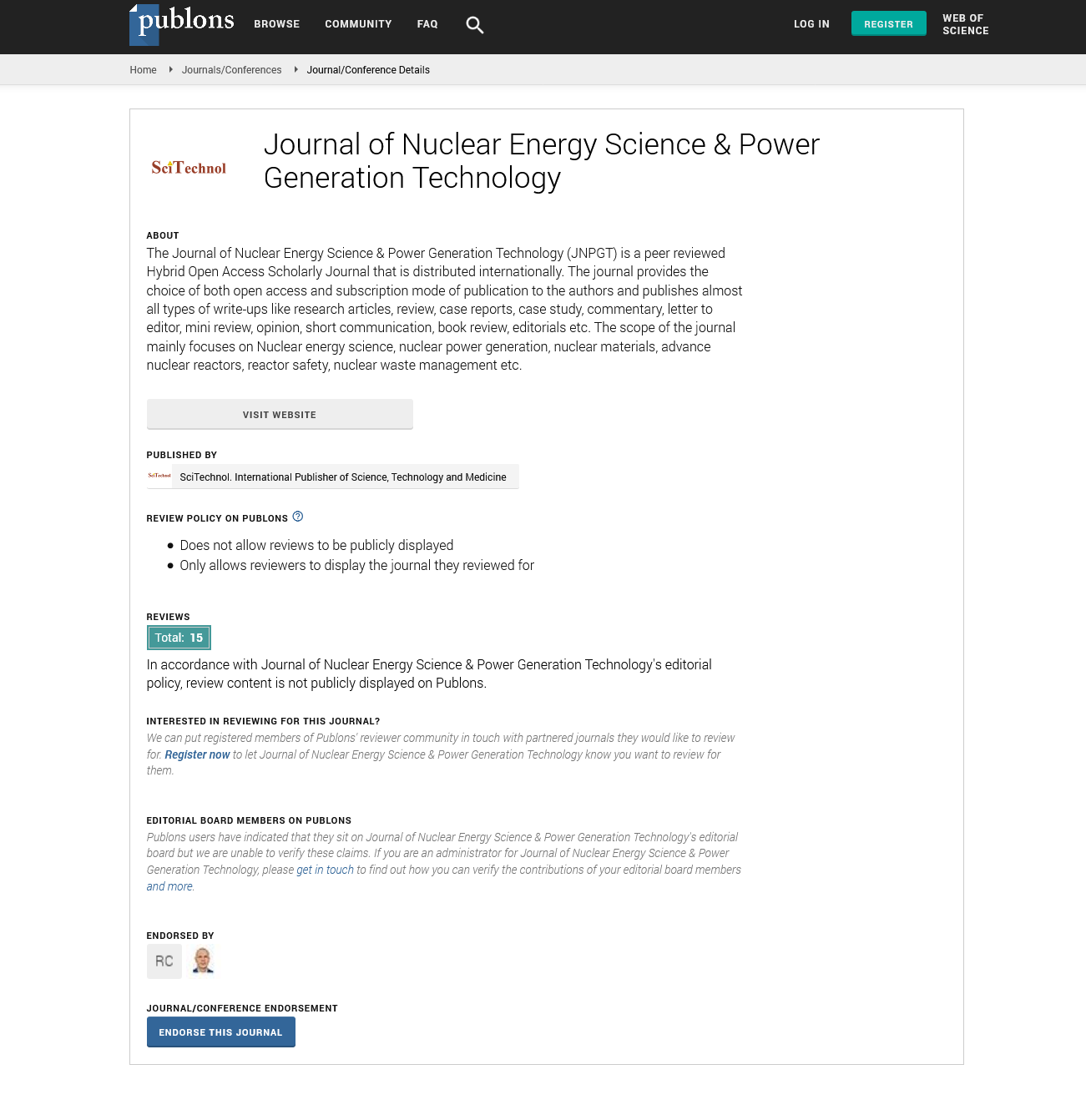Reused lithium-ion battery applied in water treatment plant: The progress in Taiwan
Wu-Yang Sean and Yi-Hsien Chiang
Chung Yuan Christian University, Taiwan
: J Nucl Ene Sci Power Generat Technol
Abstract
We study the application of renewable energy sources in wastewater treatment plants (WWTPs) aimed at achieving selfsustainability of electricity. The energy usage of one WWTP in the urban city of Dihua in Taipei is illustrated. Under the consideration of environment, cost and performance, automotive reused lithium-ion battery (RLIB) is employed to stabilize renewable energies, and shave peak power at noon. There are two typical automotive lithium-ion batteries used in this study after selection of suitable battery cells. In particular, one simple, converterless energy management system (EMS) has been developed, and integrated in new RLIB pack. The control strategy between RLIB and additional physical battery is adjusted by simulation. An online estimation of RLIB’s internal resistance (IR) and open-circuit voltage (OCV) monitoring scheme is applied in EMS for ensuring the safety of RLIB. Through the bench test and rough estimation, EMS shows great potential in elongating life cycle and possible benefit from feed-in tariff (FIT) and peak shift of electricity charges.
Recent Publications
1. Se-Min Jeong, Wu-Yang Sean, Lin-Han Chiang Hsieh and Chih-Yung Huang (2016) Direct numerical simulation of CO2 hydrate dissociation in homogeneous porous media by applying CFD method. International Journal of Heat and Mass Transfer 107(2017): 300–306.
2. Pei-Yi Yu, Wu-Yang Sean, Ren-Yu Yeh, Lin-Han Chiang Hsieh, Ray-Quan Hsu, et al. (2016) Direct numerical simulation of methane hydrate dissociation in pore-scale flow by using CFD method. International Journal of Heat and Mass Transfer 113(2017):176–183.
3. Yi-Hsien Chiang, Wu-Yang Sean, Chih-Yung Huang and Lin-Han Chiang Hsieh (2015) Adaptive control for estimating insulation resistance of high-voltage battery system in electric vehicles. Environmental Progress & Sustainable Energy 36(6):1882–1887.
4. Ayako Fukumoto, Wu-Yang Sean, Toru Sato, Akihiro Yamasaki and Fumio Kiyono (2014) Estimation of dissociation rate constant of CO2 hydrate under water flow. Greenhouse Gases: Science and Technology 5(2):169–179.
5. Yi-Hsien Chiang, Wu-Yang Sean and Jia-Cheng Ke (2011) Online estimation of internal resistance and open-circuit voltage of lithium-ion batteries in electric vehicles. Journal of Power Sources 196(8):3921–3932.
Biography
Wu-Yang Sean obtained his PhD in Engineering in 2005 at the University of Tokyo (Japan) for research in new resource in the ocean, methane hydrate. From 2006, before he joined Chung Yuan Christian University (CYCU) in 2013, he worked in the field of Green Energy and Electric Vehicles at a non-profit organization, ITRI in Taiwan. In ITRI, he was a Group Head and responsible for the research of industrial technologies. His solid research achievements include 11 patents filed in Taiwan, China and US with strong team work under the supervisor of Dr. Yi-Hsien Chiang. He has now joined the environmental engineering department in CYCU. His interests are focused on meso-scale numerical modelings, new energy and system integration, and reusing the automotive lithium-ion battery in waste water treatment plant.
E-mail: wysean@cycu.edu.tw
 Spanish
Spanish  Chinese
Chinese  Russian
Russian  German
German  French
French  Japanese
Japanese  Portuguese
Portuguese  Hindi
Hindi 

